Current Affairs 11 October 2023.
Today’s News.
The Maldives, the evolution of a democracy.
Current Affairs 11 October 2023 | Relevant for GS Paper-2, International Relation.
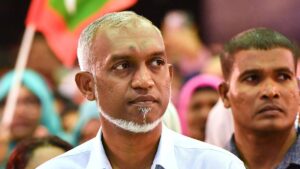
- The Maldives, South Asia’s smallest nation state, sent a clear signal through its latest presidential election: democracy is thriving. The holding of yet another free and fair election enhances the country’s international prestige.
- The key issues at play related to the concerns of voters, especially young voters, for their economic wellbeing: employment, housing and improvements needed for the tourism industry, education, and health care.
- The old era, when Maumoon Abdul Gayoom ruled as the President from 1978 to 2008, gave way to a multiparty democracy under a new constitution. Mohamed Nasheed, a charismatic but mercurial leader, became the first directly elected President.
- Abdulla Yameen, the most pro China president so far, served his full term (2013–18), followed by Ibrahim Mohamed Solih, the candidate of the Maldivian Democratic Party (MDP) and the architect of ‘India First’ policy, who served from 2018 till now. Following his defeat, he will hand over the presidency to the clear winner — Mohamed Muizzu, the opposition candidate backed by an alliance of the Progressive Party of Maldives and the People’s National Congress.
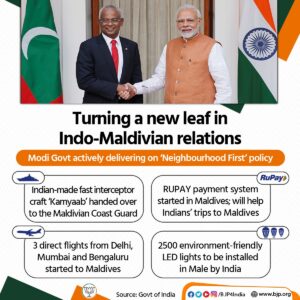
- Why then, was Mr. Solih defeated? There are three reasons. First, he was fighting against the currents of history: no incumbent has been reelected in the Maldives. People feel empowered by the weapons of democracy, to bring in and oust rulers. Second, what seemed a certainty became inevitable once the ruling MDP party split and Mr. Nasheed exited. Mr. Solih’s apparent attachment to the presidential chair clashed with Mr. Nasheed’s overwhelming ambition.
- Third, old timers believe that with Mr. Nasheed, a communicator par excellence, gone, the MDP could not effectively counter the disinformation campaign launched by the opposition alliance, which inserted, unnecessarily, the issues of geopolitics in a domestic campaign.
- The election results have triggered rapid developments. At the request of Presidentelect Muizzu, President Solih agreed to shift former President Yameen from prison to house arrest. Mr. Yameen is serving a long sentence (11 years) for corruption.
- In external relations, the new administration will have at least three choices: revert to the ‘India Out’ campaign of former President Yameen; continue the ‘India First’ policy of the outgoing President; or innovate a calibrated policy that allows a balancing of relations with its key partners, especially China and India.
- For India, the next phase of regional diplomacy may admittedly be complex. But enough assets and achievements exist to impart confidence. At the people’s level, a positive mindset prevails towards India.
- This has been reinforced by extensive development work and numerous small community development projects already completed, such as the building of community centres, children’s parks, and student ferries between islands.
- But more can be done and should be considered. First, the Colombo Security Conclave (comprising India, Sri Lanka, the Maldives, Mauritius, Bangladesh and the Seychelles) should be strengthened showing tangible outcomes in maritime security and the development of the Blue Economy.
- Finally, there is the perennial need for additional resources so that India’s strategic community and media organisations take a greater interest in a small but vital neighbour, building bridges of mutual understanding and trust.
IMF raises India’s FY24 GDP growth forecast to 6.3%.
Current Affairs 11 October 2023 | Relevant for GS paper-3, Growth.
- The International Monetary Fund (IMF) on Tuesday raised India’s economic growth forecast for the current fiscal year to 6.3%, from 6.1% earlier.
- The IMF expects retail inflation in the South Asian nation to quicken to 5.5% in 2023/24 before easing to 4.6% in 2024/25.
- Growth in India is projected to remain strong, at 6.3% in both 2023 and 2024, with an upward revision of 0.2 percentage points for 2023, reflecting stronger than expected consumption during April –June.
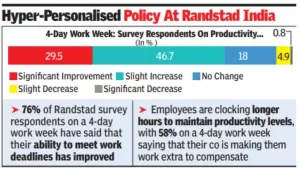
- The RBI has projected CPI based inflation for the current fiscal year at 5.4% while GDP growth is seen at 6.5%. Monetary policy projections are consistent with achieving the Indian central bank’s inflation target over the medium term.
- The Fund cut its growth forecasts for China and the euro area and said overall global growth remained low and uneven despite what it called the “remarkable strength” of the U.S. economy.
India’s space tech industry has ‘downstream’ potential.
Current Affairs 11 October 2023 | Relevant for GS paper-3 Science and technology.
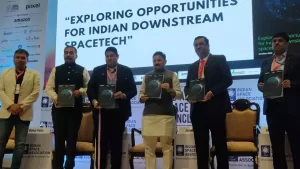
- Much of the demand for satellite technology applications will be decided by demand on earth, Deloitte India said in a report published with the Indian Space Association and NASSCOM.
- The report analyzes the ‘downstream’ opportunities in space technology (space technology). ‘Downstream’ is a reference to services like communications, earth imaging and navigation that satellites enable.
![]()
- It’s no longer just technical challenges that will decide the trajectory of satellite enabled services by the private sector — ‘constellations’ of satellites are already orbiting the earth, blanketing the planet with internet coverage in places that terrestrial networks haven’t even reached.
- Despite the rapid evolution of satellite technologies in recent years, potential opportunities do not show tremendous headroom in India, owing to its small share in the global space tech market.
- Other applications like ecological monitoring, surveying and logistics tracking rarely exceed $1 billion in market promise.
Operation Kachchhap.
Current Affairs 11 October 2023 | Relevant for Prelims, GS paper-3, Environment and ecology.

- In a recent operation named “Kachchhap,” the Directorate of Revenue Intelligence (DRI) has successfully rescued nearly a thousand live baby Gangetic turtles, shedding light on the ongoing battle against illegal wildlife trade and the protection of these unique creatures.
- The Ganga river system in India is home to 13 species of turtles, they face various threats from habitat loss, overexploitation, and pollution.
- The operation resulted in the recovery of live baby turtles of different species, such as the Indian Tent Turtle, Indian Flap shell Turtle, Black Spotted/Pond Turtle, and Brown Roofed Turtle., some of which are considered vulnerable or near-threatened species according to the International Union for Conservation of Nature (IUCN) Red List and are protected under the Wildlife (Protection) Act, 1972.
- DRI serves as India’s premier anti-smuggling agency, operating under the Central Board of Indirect Taxes & Customs, Ministry of Finance. It is responsible for detecting and preventing various forms of smuggling, including illicit wildlife trade.
2023 Nobel Prize in Economic Sciences.
Current Affairs 11 October 2023 | Relevant for GS Paper-3, Prelims.

Recently, the Nobel Prize in Economics for 2023 has been awarded to Claudia Goldin, a Harvard University professor, for research that has advanced the understanding of the Gender Gap in the Labor Market.
Nobel Prize in Economic Sciences.
- The Nobel Prize in Economic Sciences was established in 1968 by the Sveriges Riksbank (the central bank of Sweden) in memory of Alfred Nobel, the inventor of dynamite and the founder of the Nobel Prizes.
- It is officially called the Sveriges Riksbank Prize in Economic Sciences in Memory of Alfred Nobel.
- Unlike the original Nobel Prizes in fields like physics, chemistry, medicine, literature, and peace, which were established by Nobel’s will, the Nobel Prize in Economic Sciences is not one of the original Nobel Prizes.
- The prize was established later to honor outstanding contributions to the field of economics.
- The Prize recognizes individuals or organizations for their exceptional research, discoveries, or contributions that have advanced the understanding of economics and its application to real-world problems.
- Goldin has been a pioneer in studying the role of women in the economy and has written several books on the topic, such as Understanding the Gender Gap: An Economic History of American Women (Oxford, 1990), and Career & Family: Women’s Century-Long Journey toward Equity (Princeton University Press, 2021).
Findings of Claudia’s Research.
- Historical Perspective: Before Industrialization, women were more likely to be involved in economic activities related to agriculture and cottage industries.
- However, with the rise of industrialization and factory-based work, women faced difficulties leaving their homes to work.
- Role of the Services Sector: In the early 20th century, the growth of the services sector played a pivotal role in women’s access to higher education and employment opportunities.
- This sector offered more opportunities for women to enter the workforce.
- Marriage Barriers: By the beginning of the 20th century, while around 20 % of women were gainfully employed, the share of married women was only 5 %.
- Goldin noted that legislation known as “marriage bars” often prevented married women from continuing their employment as teachers or office workers.
- Despite an increasing demand for labour, married women were excluded from parts of the labour market.
- Role of Expectations and Career Choices: Women’s expectations about their future careers played a significant role in the Gender Pay Gap.
- Women’s career decisions were influenced by the experiences of their mothers, leading to choices that did not necessarily prioritize long, uninterrupted, and fruitful careers.
- Role of Contraceptive Pills: The availability of easy-to-use contraceptive pills by the end of the 1960s allowed women to exercise greater control over childbirth and plan their careers and motherhood.
- This led to more women studying subjects like law, economics, and medicine and entering various fields of employment.
- Role of Parenthood in Pay Gap: Despite improvements in education and employment opportunities for women, a significant gender-based pay gap persisted.
- Initial earnings differences between men and women were small. However, once the first child arrived, women’s earnings fell, and they did not increase at the same rate as men’s earnings, even if they had similar education and professions.
- Parenthood played a role in the widening pay gap.
Aviation Industry in India.
Current Affairs 11 October 2023 | Relevant for Relevant for GS Paper-3, Growth related to various sectors.
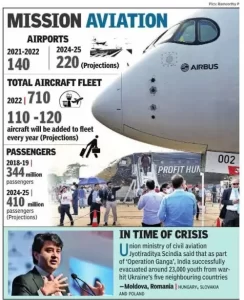
India’s aviation industry has witnessed remarkable growth in recent years. However, this rapid expansion has also highlighted critical issues including severe shortage of experienced pilots.
Status of the Aviation Industry in India.
- About: India’s aviation industry is a collective sector encompassing all aspects of civil aviation within the country.
- It includes various components, such as airlines, airports, aircraft manufacturing, aviation services, and regulatory authorities.
Status:
- India has become the third-largest domestic aviation market in the world. India’s airport capacity is expected to handle 1 billion trips annually by 2023.
- According to the data released by the Department for Promotion of Industry and Internal Trade (DPIIT), FDI inflow in India’s air transport sector (including air freight) reached USD 3.73 billion between April 2000-December 2022.
Associated Challenges:
Infrastructure Constraints:
- Airport Congestion: Many major airports in India, including those in Mumbai and Delhi, face severe congestion, leading to delays and operational inefficiencies.
- Limited Regional Connectivity: While major cities are well-connected, smaller towns and regions often lack adequate airport infrastructure and air connectivity.
High Operating Costs:
- High taxes on aviation turbine fuel (ATF) and airport charges contribute to increased operating costs.
- Some Indian states charge up to 30% taxes on jet fuel, which makes shorter flight routes unprofitable for smaller airlines.
Pilot Shortages:
- Airlines in India often struggle to recruit and retain experienced pilots, leading to disruptions and increased labor costs.
- The surge in aircraft orders, totaling over 1,100 new planes, translates into a need for thousands of flight crew members.
- However, the average cost of pilot training in India is nearly ₹1 crore.
- Airlines often charge additional fees to cadet pilots under various pretexts, significantly increasing the financial burden.
- Security Threats: Beyond terrorism and hijacking, security concerns are increasingly associated with cyber threats to aviation infrastructure, which can disrupt operations and compromise passenger data.
- Other Challenges: Critics argue that the management of medical standards by Indian Air Force doctors has led to the grounding of a significant number of civilian pilots.
- Also, there are numerous challenges associated with operating a flying training center, exacerbated by corruption among officials who enforce regulations dating back to pre-Independence times.
Related Government Initiatives:
- Goods and Services Tax (GST) rate reduced to 5% from 18% for domestic Maintenance, Repair and Overhaul (MRO) services.
- RCS-UDAN was launched to promote air connectivity to unserved and underserved airports in Tier-II and Tier-III cities to stimulate regional growth and provide affordable air travel to the citizens.
- National Civil Aviation Policy 2016.
Related Blogs…
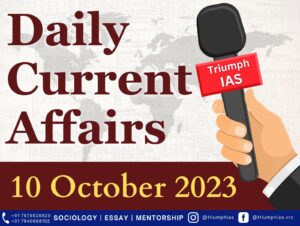 |
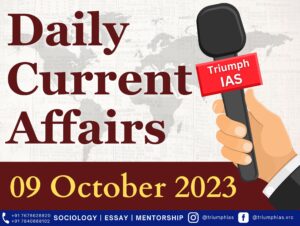 |
GS Related Practices Question…
To master these intricacies and fare well in the Sociology Optional Syllabus, aspiring sociologists might benefit from guidance by the Best Sociology Optional Teacher and participation in the Best Sociology Optional Coaching. These avenues provide comprehensive assistance, ensuring a solid understanding of sociology’s diverse methodologies and techniques.
META TAGS:
Current affairs 11 October 2023, Current affairs 10 October 2023, Today news, Today news GS, Today news upsc, Today news and views, Today news 2023, Today news Current affairs September 2023, Current affairs news, Current affairs book pdf, Current affairs best blog, Current affairs for UPSC, Current affairs 2023, Current affairs contact, Current affairs book, Current affairs program meaning

Choose The Best Sociology Optional Teacher for IAS Preparation?
At the beginning of the journey for Civil Services Examination preparation, many students face a pivotal decision – selecting their optional subject. Questions such as “which optional subject is the best?” and “which optional subject is the most scoring?” frequently come to mind. Choosing the right optional subject, like choosing the best sociology optional teacher, is a subjective yet vital step that requires a thoughtful decision based on facts. A misstep in this crucial decision can indeed prove disastrous.
Ever since the exam pattern was revamped in 2013, the UPSC has eliminated the need for a second optional subject. Now, candidates have to choose only one optional subject for the UPSC Mains, which has two papers of 250 marks each. One of the compelling choices for many has been the sociology optional. However, it’s strongly advised to decide on your optional subject for mains well ahead of time to get sufficient time to complete the syllabus. After all, most students score similarly in General Studies Papers; it’s the score in the optional subject & essay that contributes significantly to the final selection.
“A sound strategy does not rely solely on the popular
Opinion of toppers or famous YouTubers cum teachers.”
It requires understanding one’s ability, interest, and the relevance of the subject, not just for the exam but also for life in general. Hence, when selecting the best sociology teacher, one must consider the usefulness of sociology optional coaching in General Studies, Essay, and Personality Test.
The choice of the optional subject should be based on objective criteria, such as the nature, scope, and size of the syllabus, uniformity and stability in the question pattern, relevance of the syllabic content in daily life in society, and the availability of study material and guidance. For example, choosing the best sociology optional coaching can ensure access to top-quality study materials and experienced teachers. Always remember, the approach of the UPSC optional subject differs from your academic studies of subjects. Therefore, before settling for sociology optional, you need to analyze the syllabus, previous years’ pattern, subject requirements (be it ideal, visionary, numerical, conceptual theoretical), and your comfort level with the subject.
This decision marks a critical point in your UPSC – CSE journey, potentially determining your success in a career in IAS/Civil Services. Therefore, it’s crucial to choose wisely, whether it’s the optional subject or the best sociology optional teacher. Always base your decision on accurate facts, and never let your emotional biases guide your choices. After all, the search for the best sociology optional coaching is about finding the perfect fit for your unique academic needs and aspirations.
To master these intricacies and fare well in the Sociology Optional Syllabus, aspiring sociologists might benefit from guidance by the Best Sociology Optional Teacher and participation in the Best Sociology Optional Coaching. These avenues provide comprehensive assistance, ensuring a solid understanding of sociology’s diverse methodologies and techniques. Sociology, Social theory, Best Sociology Optional Teacher, Best Sociology Optional Coaching, Sociology Optional Syllabus.
Best Sociology Optional Teacher, Sociology Syllabus, Sociology Optional, Sociology Optional Coaching, Best Sociology Optional Coaching, Best Sociology Teacher, Sociology Course, Sociology Teacher, Sociology Foundation, Sociology Foundation Course, Sociology Optional UPSC, Sociology for IAS,
Follow us :
🔎 https://www.instagram.com/triumphias
🔎https://www.youtube.com/c/TriumphIAS
🔎https://t.me/VikashRanjanSociology
Find More Blogs…
| Compare and contrast Karl Marx’s and Max weber’s | Karl Marx- Historical Materialism |
| Talcott Parsons : Social system | Scope of the subject and comparison with other social sciences |

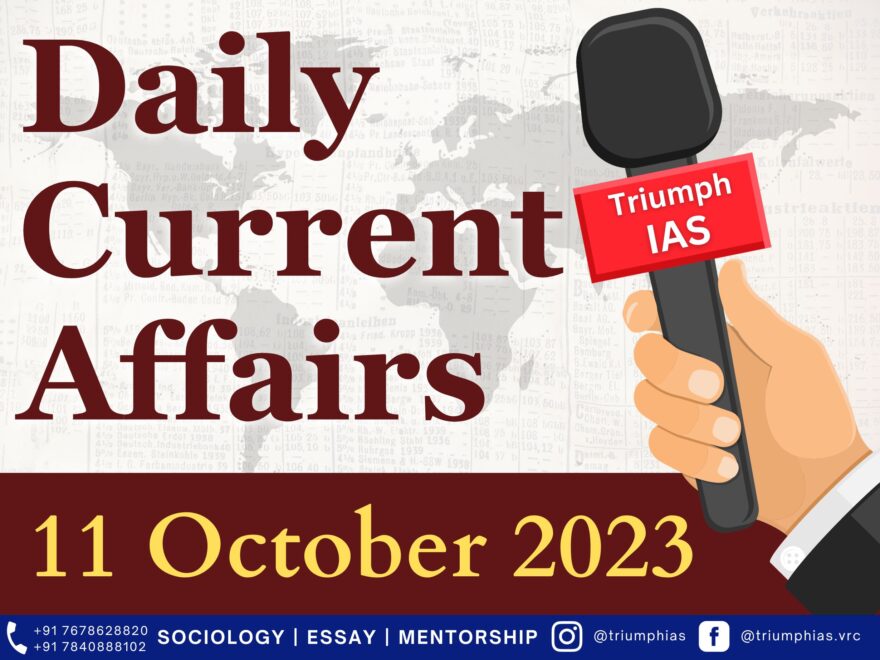
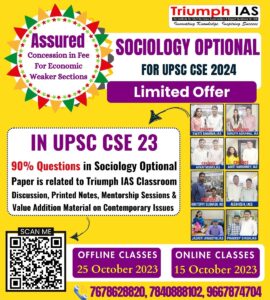
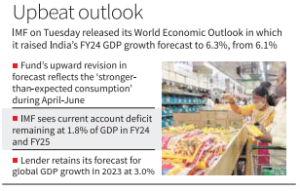
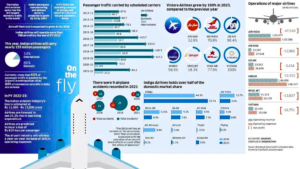
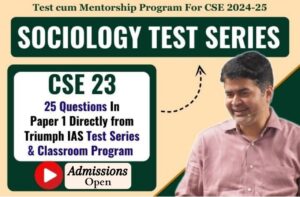
2 comments